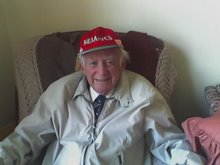
“No one has ever asked me for my autograph in my life,” a shocked and hungry Lou said in Beze Café in between bites of his Belarusian poppy-seed strudel.
Lou, husband of February’s Best Babushka, vaguely remembers his awkward Brooklyn schoolmate Allen Konigsburg. But the first time Lou saw Allen on his TV set, it took a while to sink in that little Allen K. had become celebrity-comedian Woody Allen.
That was a long time ago, and Lou has since come to terms with the fact that he would probably not reach the public eminence achieved by his elementary-school associate, which is not to say that he would not surpass his accomplishments. Little did Lou know, however, that his decision to become an English Language Fellow in the Minsk State Linguistic University through the U.S. Department of State would immortalize his name as renown scholar of film and companion to the rich and famous.
This year’s American Film Festival in Minsk was sponsored by the American Embassy in Belarus and was held in the soviet-era Victory Theater. The film lineup features such classics as Kramer vs. Kramer, directed by Robert Benton and starring Dustin Hoffman, and of course Annie Hall, directed by and starring little Allen K.
The U.S. Embassy could not hold back from asking Lou to introduce Annie Hall. Lou spoke of recollections of his classmate, growing up in Brooklyn, and even mentioned that his wife, February’s Best, went to school in Astoria, Queens with Christopher Walken, who also makes a cameo in Annie Hall as Annie’s creepy brother. She remembers eating delicious pastries at Christopher’s father’s store, “Walken’s Bakery.”
Judging by the roaring laughter, the assembled audience, about 1,000-Belarusians-strong, appreciated Allen’s humor more than your average American.
In the above photo: Much to his wife’s surprise, Belarusian students crowded around Lou to ask for his autograph and seek advice.
Lou, husband of February’s Best Babushka, vaguely remembers his awkward Brooklyn schoolmate Allen Konigsburg. But the first time Lou saw Allen on his TV set, it took a while to sink in that little Allen K. had become celebrity-comedian Woody Allen.
That was a long time ago, and Lou has since come to terms with the fact that he would probably not reach the public eminence achieved by his elementary-school associate, which is not to say that he would not surpass his accomplishments. Little did Lou know, however, that his decision to become an English Language Fellow in the Minsk State Linguistic University through the U.S. Department of State would immortalize his name as renown scholar of film and companion to the rich and famous.
This year’s American Film Festival in Minsk was sponsored by the American Embassy in Belarus and was held in the soviet-era Victory Theater. The film lineup features such classics as Kramer vs. Kramer, directed by Robert Benton and starring Dustin Hoffman, and of course Annie Hall, directed by and starring little Allen K.
The U.S. Embassy could not hold back from asking Lou to introduce Annie Hall. Lou spoke of recollections of his classmate, growing up in Brooklyn, and even mentioned that his wife, February’s Best, went to school in Astoria, Queens with Christopher Walken, who also makes a cameo in Annie Hall as Annie’s creepy brother. She remembers eating delicious pastries at Christopher’s father’s store, “Walken’s Bakery.”
Judging by the roaring laughter, the assembled audience, about 1,000-Belarusians-strong, appreciated Allen’s humor more than your average American.
In the above photo: Much to his wife’s surprise, Belarusian students crowded around Lou to ask for his autograph and seek advice.

















